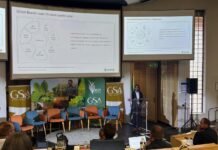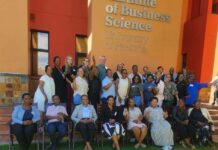By: Duncan MacFadyen and Rendani Nenguda
Global efforts to limit carbon emissions are falling short, developed countries have not coughed up the $100 billion promised to help developing countries meet targets, and the EU is set to impose carbon taxes that will hamstring Africa’s development ambitions.
Exactly how far countries have fallen short in meeting global climate goals and mitigating greenhouse gas emissions will be revealed by the first Global Stocktake due to be presented to delegates at COP28 in Dubai in early December. In spite of these headwinds, OGRC research on ecosystem conservation, financing, carbon credits and wildlife economies will be highlighted at COP28 to show how African countries can put the brake on climate change while keeping the economy thriving.
As the world continues to heat up at an unprecedented rate, scientists grapple with trying to understand the global impact and the historical lack of decisive action. Climate has shifted temperatures and weather patterns, and although some of these changes are natural the dramatic fluctuations in temperatures and sporadic rainfall patterns are of great concern. Scientists have persistently highlighted human activities, particularly the unbridled burning of fossil fuels such as coal, oil, and gas since the industrial revolution, as the primary drivers behind these observed changes. “Freak weather events” – severe fires, changes in the rainfall patterns in tropical cyclones, heatwaves and flooding – have led to biodiversity loss, ecosystem degradation and mass extinctions. These changes have damaged commercial agriculture, subsistence farming and household food security.
There is however hope. Government, business and industry are recognising that robust scientific data and recommendations from scientists are the solid base on which meaningful decisions are made.
At COP28, UAE, NGOs, politicians, scientists, youth, business, investors, civil society and frontline communities will engage in critical discussions and decision-making about global climate change. The key themes to be addressed will include transforming climate finance by delivering on old promises, putting nature, people, lives, and livelihoods at the heart of climate action and fast-tracking the energy transition to slash emissions before 2030. The aim is to limit the global temperature rise to below 2°C, preferably below 1.5°C, above pre-industrial levels. However, the latest Intergovernmental Panel on Climate Change (IPCC) report suggests that even with our best possible mitigation efforts, the chances of us limiting temperature rise to 1.5 degrees will not be achieved.
The Global Stocktake (GST) will provide a comprehensive assessment of progress made by countries to mitigate greenhouse gas emissions, adapt to the impacts of climate change, and provide support to developing nations in these endeavours. Unfortunately, the developed world has fallen short of fulfilling its financial commitments of $100 billion in annual funding to assist developing countries reduce their emissions and manage the impacts of climate change. The failure to fulfil financial commitments has further derailed the world in the ambition to reduce its emissions by 43% by 2030. The financial commitment required to reach these reductions far outweighs what already heavily indebted developing countries require – yet undershoot the financial capacity the combined developed countries have the capacity to provide.
Yet, instead of meeting their obligations, the European Union has introduced the Carbon Border Adjustment Mechanism, a policy that imposes a carbon cost on certain imports based on the carbon emissions associated with the production of those goods. The implications for African exports to the EU are substantial, potentially hindering the continent’s development ambitions and causing an annual GDP loss of around $31 billion. The justification for the policy is to level the playing field for industries within the EU that are subject to strict emissions reduction requirements. We have to question how this reasoning coming from nations that have benefited from fossil fuel use for over 250 years is justifiable, when they are yet to fulfil their commitments to ensure that we have the capacity to explore alternative greener technologies and transition from coal heavy industries to renewable energy sources.
In this context, it becomes evident that for any meaningful change to occur, Africa, where feasible, must assume a leadership role in shaping policies that not only articulate our needs but also position us advantageously in the global fight against climate change.
Recognising that climate change is a collective responsibility, Oppenheimer Generations Research and Conservation (OGRC) has committed to contributing to the global effort to combat the adverse effects of climate change. We view COP 28 as an invaluable platform to showcase the innovations and climate research done by our partners.
Our Future Ecosystems for Africa (FEFA) programme, in collaboration with AGNES (African Group of Negotiators Expert Support) and OGRC, has recognised the need to mobilise African climate science and evidence on the continent, to feed into important discussions and provide an integrated, technical summary of the potential synergies and trade-offs between climate actions and sustainable development. This work focuses on developing viable and pragmatic solutions to contemporary climate-related challenges, derived in collaboration with numerous other research partners, with the overarching goal of enhancing decision-making processes in relation to climate change and development on the African continent.
In line with COP28’s core theme of “investing in climate solutions by committing and investments in nature-positive projects, policies and practices, OGRC has partnered with the African Wildlife Economy Institute (AWEI) to address these aspects. Conserving Africa’s biodiversity and the ecosystem services it provides should be central to climate change responses, given the high dependence of people on these services. The key finding of the Africa chapter of the last IPCC report was that reduced species representation in protected areas is predicted due to climate-induced range shifts, with range shifts impeded by increasing land transformation and fencing. African countries urgently need complementary conservation strategies to mitigate the effects of climate change on biodiversity. Wildlife economies present one such strategy, which involves increasing the extent of conserved ecosystems and their connectivity, while also contributing to livelihoods and food security through sustainable wildlife use, including hunting, harvesting, meat, and tourism. Our research also shows that wildlife economies have more diverse revenue streams than conventional agriculture, which builds their resilience to disturbance and change. Wildlife economies can simultaneously contribute to climate change mitigation and adaptation in Africa through sequestering carbon while conserving biodiversity and promoting resilient livelihoods.
Another OGRC-supported programme, the African Leadership Universities (ALU), School of Wildlife Conservation, states “you can’t manage what you don’t measure”. The key concept here is to gather consistent, comparable data on the impacts of climate change on wildlife economies across Africa. In Africa, climate action alone is unlikely to succeed, but if combined with development in a way that wildlife is seen as a key strategic asset, it will encourage investment and finance in conservation.
OGRC has further invested in Rewild Capital, a carbon credits company. Experts from Rewild Capital use their knowledge of international carbon market dynamics and integration into global networks to reduce transaction information asymmetry and secure the best prices and terms for landowners across the continent. Their carbon and rangeland scientists deal with the complexity of meeting international carbon standards requirements. From start to finish they take care of soil carbon measurements and analysis.
These measures ensure that Africa can lead in the mitigation of climate change, while securing livelihoods in non-forested African ecosystems. Some of the major messages that will emerge from COP28 are on workstreams that will attract climate investment and finance, as well as assessing mitigation and adaptation response measures. Research tells us that finance gaps across Africa are huge and that new, additional money is needed.
There is a strong feeling that new, multinational, scaled finances for long-term goals are required. So, there will be focus on securing new financial pledges, while encouraging fulfilment of old promises. There will be a focus on adopting high level targets with clear delivery indicators, including the enhancement of adaptive capacity, with a hope of doubling finance. Negotiators will also be pushing for a clear roadmap to achieve these outcomes. There will be a focus on developing countries and ensuring that all are supported through delivering on promises made at COP27, with a focus on compensation and provision for historical loss and damage.
Duncan MacFadyen is head of research, and Rendani Nenguda research associate at, Oppenheimer Generations Research and Conservation.








